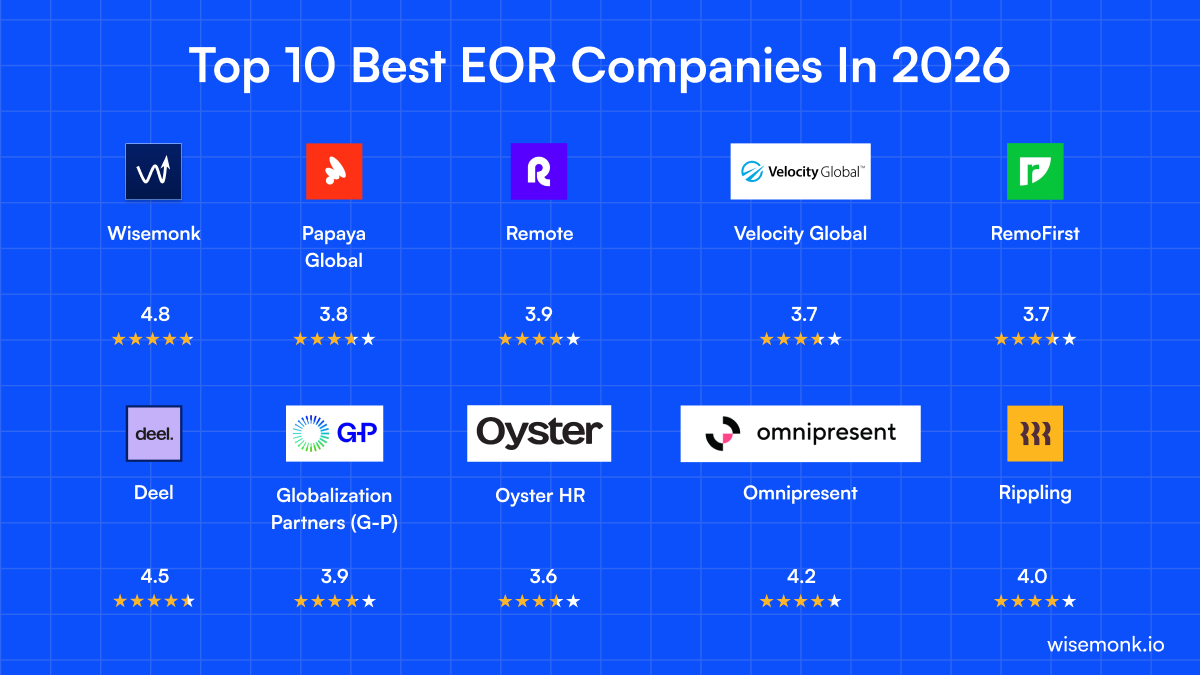Looking to hire talent in Switzerland without setting up a local entity? An employer of record EOR in Switzerland opens the door to premium market access, a skilled workforce, and seamless compliance, with none of the hassle around employment laws, Swiss social insurance, or tax hurdles. In our experience guiding international firms, a good Swiss EOR ensures smooth contracts, payroll, and benefits like collective labor agreements and 13th salary payments. Switzerland offers top-tier quality of life and effortless EU/EFTA mobility, making it the ideal European hub for growth. Choose an expert EOR, and build your Swiss team efficiently, compliantly, and with real peace of mind.
In this comprehensive guide, we’ll walk you through everything you need to know about leveraging an employer of record in Switzerland, including costs, compliance details, and strategic advantages, so you can expand with confidence.
What should you know about the Swiss employment law Framework?[toc= Employment Law Framework]
Navigating employment in Switzerland means understanding several unique rules and structures, all designed to protect both businesses and employees. Here’s what we’ve learned through years of supporting global clients:
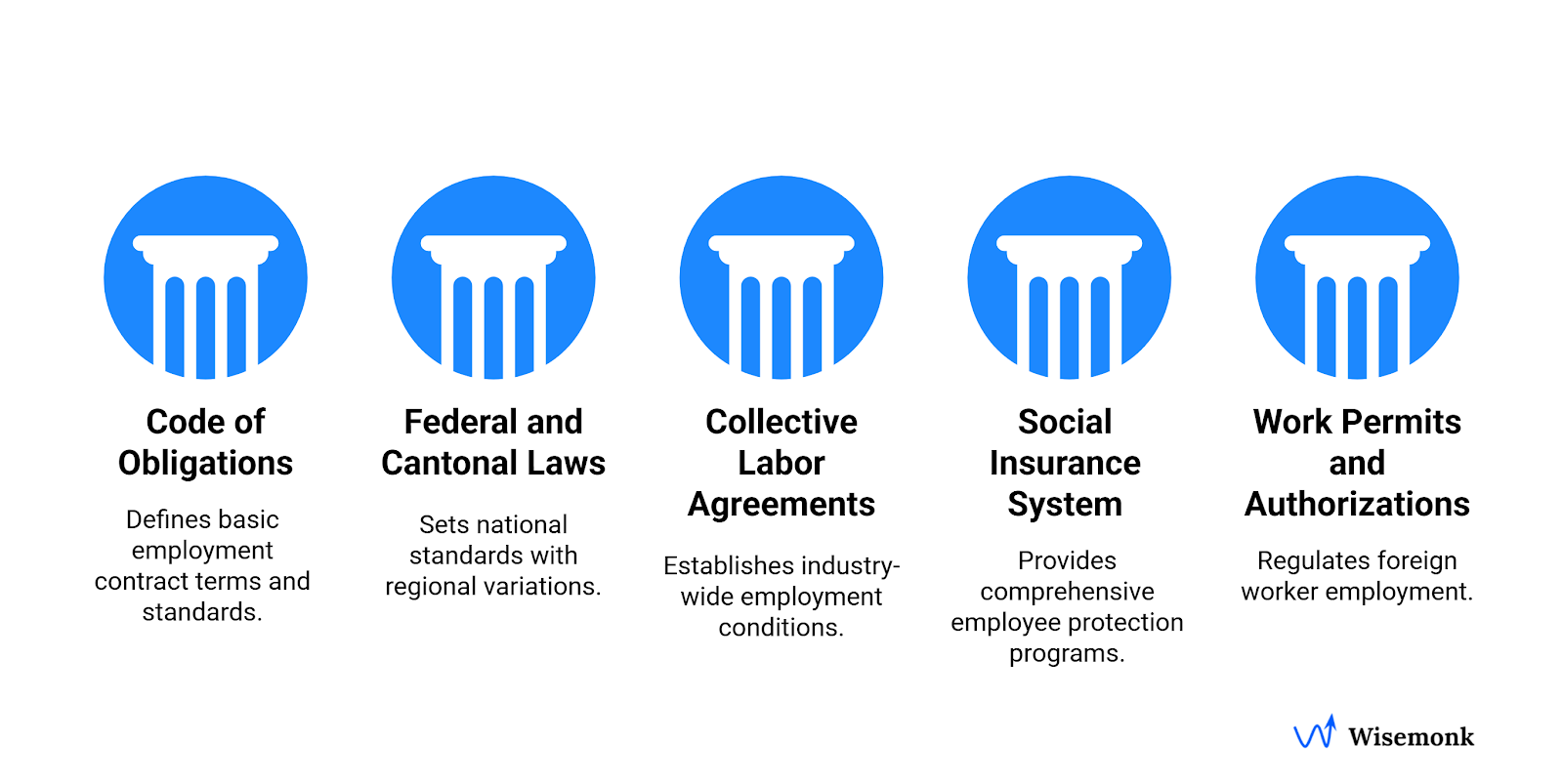
- The Swiss Code of Obligations (OR) defines the basics for every employment contract, including mutual agreements, salary rules, and required work standards. Most employment agreements in Switzerland can be written or verbal, but details like duties, salary, and working hours must always be clear.
- Federal and cantonal labor laws overlap. While federal laws set the national standard (like the Swiss Labour Act), each of Switzerland’s 26 cantons can have extra rules. We always advise partners to track local regulations. For example, on working hours or dispute resolution, as differences can impact contract terms and employer responsibilities.
- Collective Labor Agreements (CLA) are major industry benchmarks. These agreements, negotiated between employer associations and unions, set minimum wages, hours, 13th salary expectations, holidays, and other employment conditions. If you belong to a sector covered by a CLA, it will automatically extend to your workforce in that region.
- The Swiss social insurance system is comprehensive. As an employer, you contribute to major programs: AHV (old-age and survivors’), IV (disability), EO (income compensation/maternity), and ALV (unemployment insurance). These deductions are shared between the employer and employee and are managed through payroll. Compliance is not optional; it’s the backbone of Swiss employee protection.
- Work permits and residence authorizations are mandatory for foreign workers. EU/EFTA citizens enjoy easier mobility, usually needing just registration and proof of contract, while third-country nationals face stricter criteria and quotas. Permits must be secured before employment begins, and local authorities in the hiring canton handle the process.
Clarity on these core requirements makes managing Swiss teams and staying compliant for a far smoother journey.
What are the key benefits of Swiss Employer of Record services?[toc=Key Benefits]
Choosing a Swiss Employer of Record (EOR) offers clear advantages for companies expanding into Switzerland:
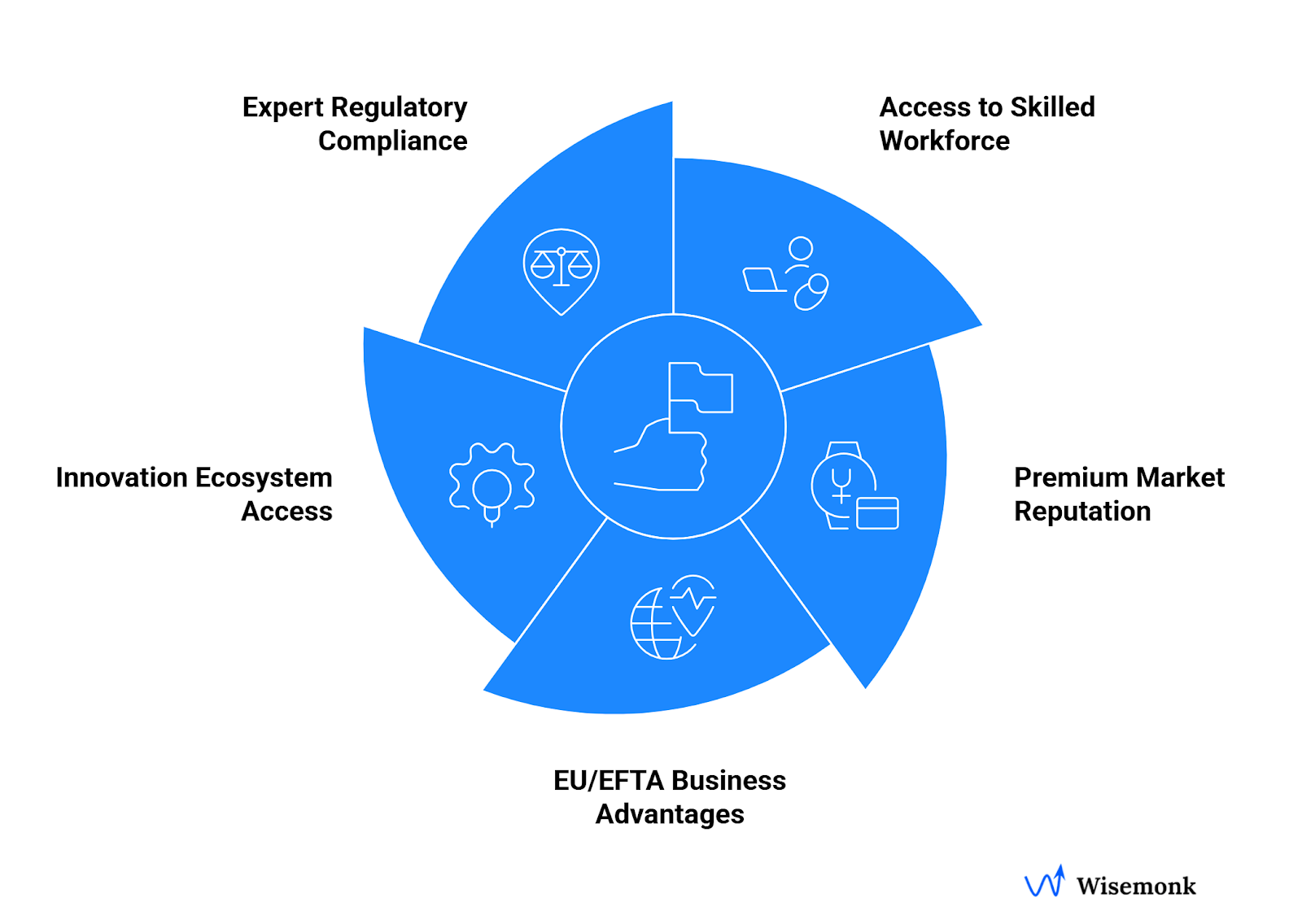
- Access to a skilled European workforce: Swiss EORs let you hire highly qualified, multilingual talent fast, without setting up a local entity, ensuring quick integration and productivity in compliance with Swiss employment laws.
- Premium market reputation: Partnering with a Swiss EOR aligns your brand with Switzerland’s high standards of quality, compliance, and collective labor agreement adherence, boosting trust with clients and partners.
- EU/EFTA business advantages: Switzerland’s ties with the EU/EFTA enable smoother work permit processing, easier labor mobility, and cross-border hiring benefits that EORs leverage for seamless legal employment and payroll management.
- Innovation ecosystem access: Swiss EORs connect you to Switzerland’s leading R&D incentives and innovation clusters, supporting growth in a dynamic business environment.
- Expert regulatory compliance: EORs manage payroll in Swiss Francs, social security contributions (AHV, IV, EO, ALV), and canton-specific laws, ensuring full compliance with complex Swiss employment regulations and reducing risk.
In our experience, Swiss EOR partnerships turn legal complexities into growth opportunities, letting you focus on expanding your business, not administrative tasks.
How do Swiss EOR Services Operate?[toc=How EOR Operates]
Swiss EORs streamline your expansion by managing essential day-to-day employment tasks, so you can focus on growing your business without the hassle.
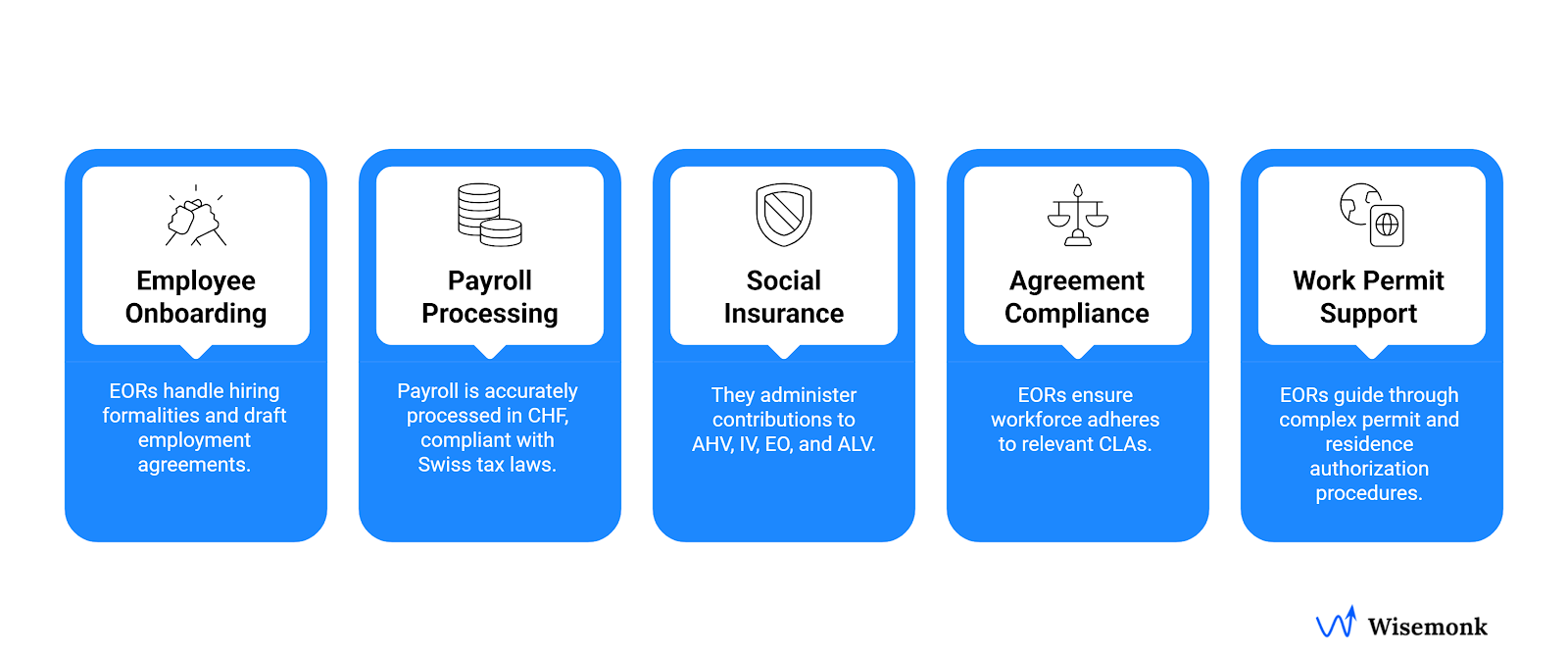
- Employee onboarding and contract negotiation: EORs manage hiring formalities, drafting employment agreements aligned with Swiss laws, including local labor laws, collective labor agreements, and statutory benefits.
- Monthly payroll processing in Swiss Francs (CHF): Payroll is accurately processed in CHF, covering salary payments, withholding taxes, occupational pension contributions, and social security deductions, completely compliant with Swiss tax laws.
- Social insurance contributions management: They administer employer and employee contributions to AHV (old-age), IV (disability), EO (income compensation), and ALV (unemployment insurance), ensuring timely filings and payments to Swiss authorities.
- Collective agreement compliance monitoring: EORs ensure your workforce adheres to relevant CLAs, covering conditions like 13th salary Switzerland, paid vacation, and dispute resolution processes, respecting cantonal variations.
- Work permit application and renewal support: For foreign workers, EORs guide through complex permit and residence authorization procedures, including EU/EFTA mobility regulations and third-country worker requirements, securing legal employment status.
These comprehensive services turn Swiss market entry into a hassle-free, fully compliant process.
What are Switzerland-specific requirements for EOR services?[toc=EOR Requirements]
When employing talent in Switzerland through an employer of record, there are a few unique Swiss requirements to know, each deeply tied to local law, tradition, and market structure.
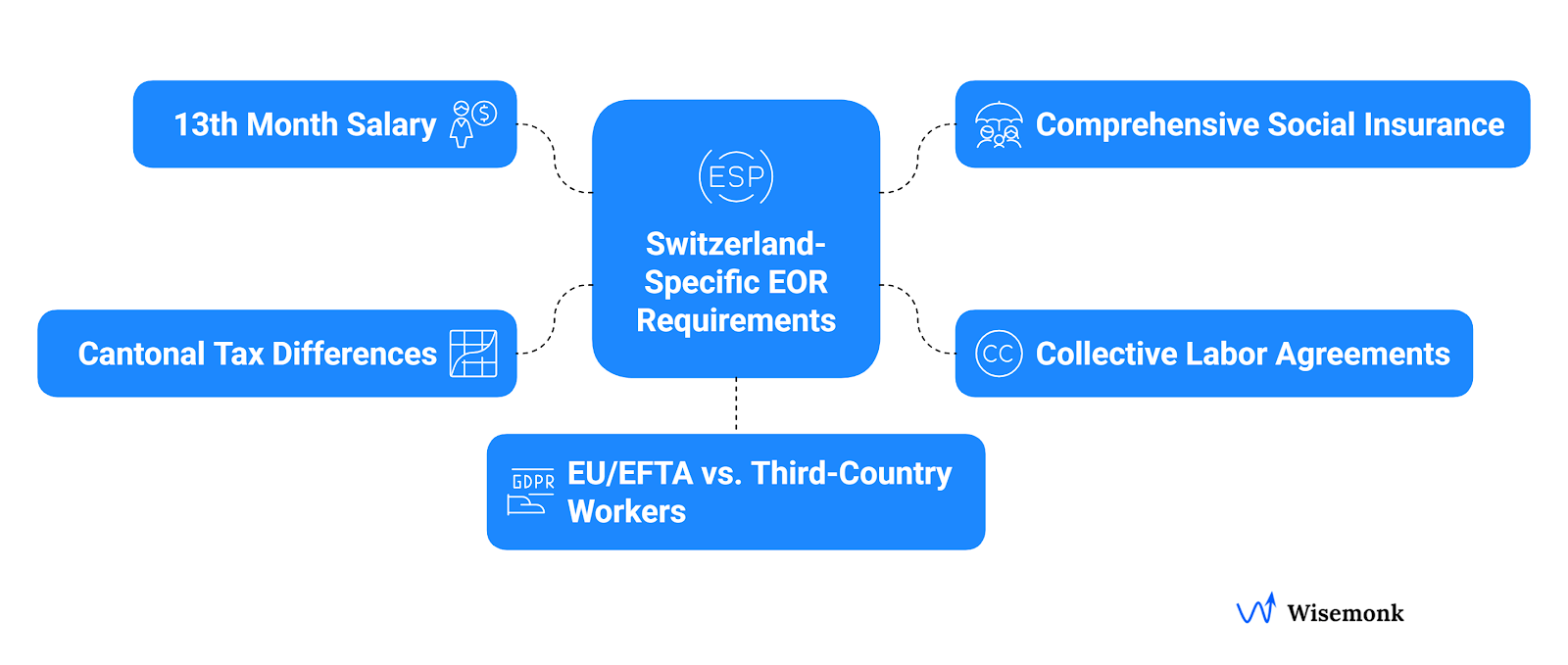
- 13th month salary: Common in Swiss employment contracts and many collective labor agreements; typically paid in December or split, and prorated for partial years, with full tax and social insurance treatment.
- Comprehensive social insurance: EORs must contribute to mandatory Swiss programs, AHV, IV, EO, ALV, for every salaried employee, splitting premiums between employer and employee.
- Collective Labor Agreements (CLAs): EORs must follow applicable sector or canton CLAs, covering minimum wages, 13th salary, leave, and work conditions.
- Cantonal tax differences: Payroll, withholding, and benefits vary by canton. EORs ensure proper pay, social contributions, and taxes based on each employee’s location.
- EU/EFTA vs. third-country workers: EORs manage simpler permit processes for EU/EFTA citizens and handle stricter requirements for third-country hires, including quotas and qualification checks.
Understanding these details is crucial for smooth, fully compliant employment in Switzerland, making EOR services invaluable for foreign employers.
How to choose the Right Swiss Employer of Record provider?[toc=How to Choose the Right EOR]
Picking the right Swiss EOR can make or break your expansion. Here’s what we’ve learned after guiding many clients in Switzerland’s unique market:
- Swiss labor law and cantonal expertise: Your EOR must have deep knowledge of both federal and local employment regulations, including the Swiss Code of Obligations and specific cantonal tax laws. Swiss law is highly decentralized, so experience handling regional variations is essential.
- Social insurance administration: Managing AHV (old-age), IV (disability), EO (income compensation), ALV (unemployment), accident insurance, and occupational pension contributions is central to compliance. The best EORs work directly with the Federal Social Insurance Office and handle employee and employer obligations accurately.
- Work permit and immigration services: Look for hands-on support with permits, residence authorizations, and EU/EFTA or third-country distinctions. EORs must know Swiss permit types (L, B) and process requirements, securing legal work status efficiently.
- Collective agreement experience: EORs need a solid track record in industries requiring collective labor agreement compliance, as these influence salary, 13th month pay, and sectoral benefits. Ask about experience in your industry and region.
- Premium service and support: In our experience, providers who offer personalized, multilingual support, transparent pricing, and digital payroll management give the smoothest results. Choose a partner with a client-focused approach and proven Swiss market reputation for compliance and HR service delivery.
A strong Swiss EOR turns compliance headaches into a seamless, premium hiring experience, freeing you to build your team and brand with confidence.
How does Swiss EOR investment compare to setting up your own entity?[toc=EOR Vs Own Entity Setup]
If you’re weighing Swiss market entry, understanding the real costs is crucial. Here’s what we regularly see in practice:
- EOR service costs: Most Swiss EOR providers charge $800–$1,500 per employee/month. This covers payroll processing, employment contracts, social security (AHV, IV, EO, ALV) management, tax filings, and employee benefits administration.
- Swiss entity formation expenses: Creating your own Swiss legal entity usually costs $10,000–$30,000 upfront for registration, notary, legal fees, plus CHF 20,000–100,000 in required share capital. Ongoing annual compliance and accounting can add $5,000–$10,000 or more, depending on canton.
- Social insurance and payroll: Running your own payroll means full responsibility for withholding taxes, social contributions, accident insurance, and occupational pension payments. Admin workloads and compliance risks are high, Swiss authorities perform regular audits.
- Professional fees: Expect ongoing legal, tax, and HR consulting expenses to maintain compliance, especially with cantonal tax laws and labor regulations. These often exceed $5,000–$10,000 per year.
- High-cost environment: Switzerland’s cost of living and doing business is among Europe’s highest. Office space, mandatory 13th salary, employee benefits, and collective agreement requirements all increase your total spend.
In our experience guiding foreign companies, Swiss EORs offer predictability, speed, and risk reduction, especially for those testing the market or hiring a few employees. Setting up your own entity makes sense for larger operations with long-term plans and local management. Either way, knowing all the costs upfront leads to smarter, more strategic decisions.
How is the Swiss Employer of Record market evolving?[toc=Market Evolution]
The Swiss EOR market is rapidly adapting to new business realities and regulatory demands:
- Digital transformation initiatives: Swiss EOR providers are adopting cloud-based payroll, automated compliance tools, and HR platforms for efficient employee management and accurate data processing in Swiss Francs.
- Sustainability and ESG requirements: Increasingly, EORs assist companies in meeting Swiss environmental, social, and governance standards, including responsible hiring practices and social insurance transparency.
- Innovation and R&D incentives: Switzerland’s strong focus on innovation means EOR-driven hires can benefit from government grants and tax relief on research and development activities, integrating seamlessly into the innovation ecosystem.
- EU relationship implications: While not an EU member, Switzerland’s complex agreements with the EU/EFTA affect work permit procedures, mobility rights, and cross-border employment rules EORs must navigate expertly.
- Future regulatory developments: The Swiss labor landscape is poised for updates, such as enhanced data protection laws and possible CLA reforms, where proactive EOR compliance will be key for successful local operations.
Staying current with these trends enables Swiss EORs to offer top-tier, compliant employment solutions, maximizing your strategic growth while managing local labor laws, collective agreements, and social security contributions smoothly.
Conclusion[toc=Conclusion]
Partnering with a Swiss Employer of Record unlocks a range of strategic advantages that simplify your European expansion. Working with an expert Swiss EOR provides:
- Seamless European access: Switzerland’s location and EU/EFTA mobility let you hire and operate across Europe without setting up local entities.
- Risk-free compliance: Expert EORs handle Swiss laws, social insurance, taxes, permits, and benefits to ensure full compliance.
- Focus on growth: Outsourcing payroll and admin to a Swiss EOR frees you to prioritize innovation and business development with quality HR support.
Based on our extensive experience as a leading EOR service provider for international companies, a Swiss EOR partnership is the smartest way to build a compliant, high-quality presence in Switzerland, and by extension, the broader European market, quickly and efficiently.
Ready to expand your global business quickly and compliantly? Partner with Wisemonk’s Employer of Record services to effortlessly manage hiring, payroll, and compliance, so you can focus on growing your business with confidence.
Frequently asked questions
What are the social insurance requirements for employees in Switzerland through EOR?
An Employer of Record (EOR) in Switzerland ensures that all employees are covered under mandatory social security contributions, including AHV (old-age and survivors’ insurance), IV (disability insurance), EO (income compensation and maternity leave), ALV (unemployment insurance), accident insurance, and occupational pension plans. The EOR manages both employer and employee contributions according to Swiss employment laws and social insurance regulations.
How does the 13th-month salary tradition work with EOR providers?
The 13th-month salary is a customary benefit in Swiss employment contracts and collective labor agreements. EOR providers administer this additional payment either annually in December or in two semi-annual installments, prorating it for partial years of employment, all while maintaining compliance with Swiss social security and tax withholding laws.
Can EOR help with EU Blue Card and work permit applications in Switzerland?
While Switzerland does not issue the EU Blue Card, a Swiss EOR supports work permit and residence authorization applications for both EU/EFTA and third-country nationals. They handle the legal complexities involved, ensuring compliance with Swiss labor market tests and mobility rules under the relevant employment regulations.
How do Collective Labor Agreements affect EOR employment in different industries?
Collective Labor Agreements (CLAs) regulate minimum wages, working hours, holidays, and benefits like the 13th salary in many Swiss industries. EOR providers ensure that all employment contracts and benefits adhere to the applicable CLA requirements, aligning with both federal Swiss employment laws and cantonal variations, guaranteeing full compliance.
What are the cantonal tax implications when using EOR services in Switzerland?
Cantonal tax rates, minimum wages, and social security contributions vary across Switzerland’s cantons. Swiss EORs manage payroll processing in Swiss Francs (CHF), applying the correct cantonal withholding taxes and statutory social security deductions. This ensures employees receive accurate net salaries while meeting all local tax laws and employment regulations.
What is proof of employment in Switzerland?
Proof of employment in Switzerland is an official document provided by an employer confirming that a person is legally employed. It typically includes details such as the employee’s name, job title, employment start date, type of contract (permanent or fixed-term), and sometimes salary information. This document may be required for visa applications, residence permits, banking, rental agreements, or government procedures to verify stable employment status.
Why use an EOR in Switzerland?
Using an EOR in Switzerland helps companies:
- Hire quickly without opening a Swiss legal entity.
- Stay compliant with strict labor and tax regulations.
- Manage payroll and benefits efficiently.
- Reduce operational risks and administrative burden.

.png)
%20(1).webp)
